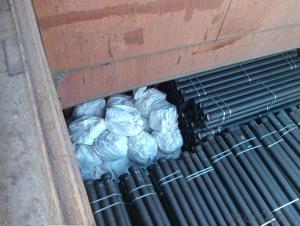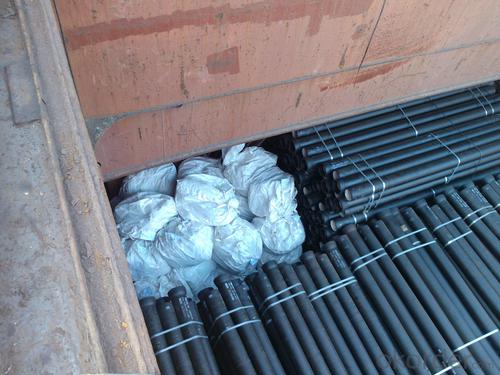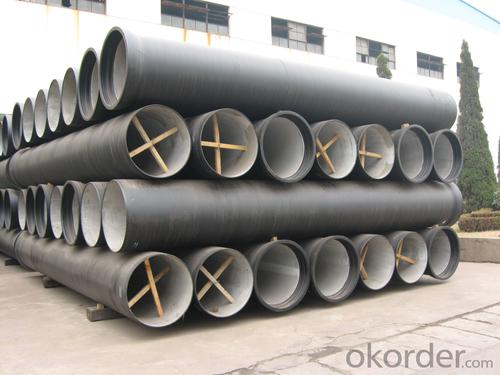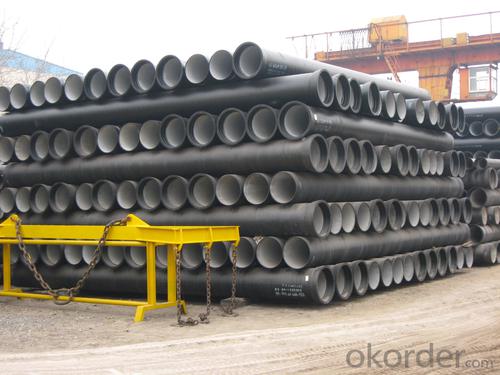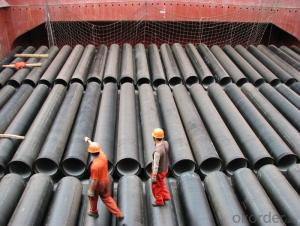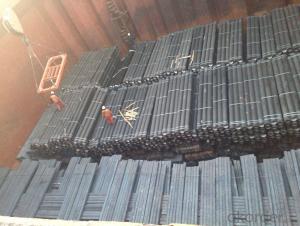DUCTILE IRON PIPE DN450 K8/C/K9
- Loading Port:
- China Main Port
- Payment Terms:
- TT OR LC
- Min Order Qty:
- -
- Supply Capability:
- -
OKorder Service Pledge
OKorder Financial Service
You Might Also Like
Specification:
1) The standard of pipe: ISO2531:1998, K9
2) Effective length: 6m
3) Inner cement line: Portland cement line as per ISO4179
4) Zinc coating: at least 130g/m2 as per ISO8179
5) Bitumen painting: at least 70um as per ISO8179
6) With 100% quantity of NBR ring, or SBR ring, or EPDM ring as per ISO4633
7) DN80mm-800mm
8) High strength, lighter than grey iron, good corrosion resistance, no furring, small flow resistance, easy fixing, long life tome about 100 yeas
9) Produced by Hangzhou chunfeng machine
10) Checked by automatic inspection equipment
11) Composition:
Chemical composition | | | | |||
Chemical composition | Ductile Cast Iron Pipe (%) | Grey iron pipe (%) | Steel pipe (%) | | | |
C | 3.5-4.0 | 3.2-3.8 | 0.1-0.2 | | | |
Si | 1.9-2.6 | 1.4-2.2 | 0.15-0.4 | | | |
Mn | 0.15-0.45 | 0.4-0.6 | 0.3-0.6 | | | |
P | ≤0.06 | ≤0.3 | 0.02-0.03 | | | |
S | ≤0.02 | ≤0.1 | 0.02-0.03 | | | |
Mg | 0.03-0.06 |
|
| | | |
12) Feature:
Mechanical properties | | | | |||
| Ductile Cast Iron Pipe | Grey Iron Pipe | Steel Pipe | | | |
Tensile Strength(Mpa) | ≥420 | 150-260 | ≥400 | | | |
Yield Strength(Mpa) | ≥300 | No Confirmation | No Confirmation | | | |
Bending Strength(Mpa) | ≥590 | 200-360 | ≥400 | | | |
Elongation (%) | ≥10 | Neglected | ≥18 | | | |
Brinell Hardness(HBS) | ≤230 | ≤230 | About 140 | | | |
13) T type mechanical joint
14) Packing: in bulk or container
- Q: How is ductile iron pipe different from cast iron pipe?
- Ductile iron pipe is different from cast iron pipe in terms of its composition and strength. Ductile iron pipe is made from a type of iron known as ductile iron, which contains small amounts of carbon and other elements that enhance its flexibility and toughness. Cast iron pipe, on the other hand, is made from cast iron, which is more brittle and less flexible than ductile iron. This makes ductile iron pipe more resistant to cracking and breaking, making it suitable for high-pressure applications.
- Q: The difference between ductile cast iron pipe and machine-made cast iron pipe
- Different installation methods, ductile iron pipes are common flexible sealing ring, slide into the connection; the main drainage pipe is W and B type, clamp connection and mechanical connection, the inner gasket ring.
- Q: Can ductile iron pipes be used for geothermal systems?
- Yes, ductile iron pipes can be used for geothermal systems. Ductile iron pipes have excellent strength and durability, making them suitable for handling the high temperatures and pressures typically encountered in geothermal systems. Their corrosion resistance and flexibility also make them a reliable choice for transporting geothermal fluid efficiently.
- Q: Can ductile iron pipes be used in areas with high temperature variations?
- Yes, ductile iron pipes can be used in areas with high temperature variations. Ductile iron has a high resistance to thermal expansion and contraction, making it suitable for withstanding temperature fluctuations without compromising its structural integrity or performance.
- Q: What is the typical wall thickness of ductile iron pipes?
- The typical wall thickness of ductile iron pipes varies depending on the size and the intended use of the pipe. Generally, ductile iron pipes have a wall thickness ranging from 0.25 inches (6.35 mm) to 0.5 inches (12.7 mm). However, for larger diameter pipes or those used in high-pressure applications, the wall thickness can be even greater. It is important to consult industry standards and specific project requirements to determine the appropriate wall thickness for a ductile iron pipe.
- Q: Are ductile iron pipes suitable for pressure sewer systems?
- Ductile iron pipes, known for their high strength and durability, are a suitable option for pressure sewer systems. They have been widely used in various applications, including pressure sewer systems, due to their ability to withstand high pressure and provide a long-lasting solution for transporting sewage under pressure. One key advantage of ductile iron pipes is their excellent corrosion resistance, which is crucial in sewer systems where they are exposed to various chemicals and contaminants. These pipes are resistant to both internal and external corrosion, ensuring their durability and functionality over time. Moreover, ductile iron pipes have a smooth internal surface, minimizing friction and improving the flow capacity of the sewer system. This feature allows the pipes to handle the required flow rates and prevent blockages or backups. Additionally, ductile iron pipes are known for their ease of installation. They can be easily cut and joined using various methods, making them a convenient choice for pressure sewer systems. Overall, ductile iron pipes offer a reliable choice for pressure sewer systems, thanks to their high strength, corrosion resistance, smooth internal surface, and ease of installation.
- Q: What is the expected deflection of ductile iron pipes under load?
- The expected deflection of ductile iron pipes under load can vary depending on several factors such as the diameter, wall thickness, material properties, and the magnitude and distribution of the load applied. Generally, ductile iron pipes have a relatively high resistance to deflection due to their inherent strength and durability. They are designed to withstand substantial loads and are often used in applications where high pressure and heavy loads are expected. To determine the expected deflection, engineers typically use structural analysis techniques such as finite element analysis or beam theory calculations. These methods take into account the specific geometry and material properties of the ductile iron pipe to predict its behavior under load. In practice, ductile iron pipes are designed with a certain maximum allowable deflection, which is usually specified by industry standards or local regulations. This maximum allowable deflection ensures that the pipe remains structurally sound and maintains its functionality. It is important to note that the expected deflection of ductile iron pipes can also be influenced by external factors such as soil conditions, installation methods, and changes in temperature. Therefore, proper installation techniques and adherence to industry guidelines are crucial to ensure the pipes perform as expected and meet the required deflection limits.
- Q: What are the different pressure ratings available for ductile iron pipe?
- Ductile iron pipe, known for its strength, durability, and resistance to corrosion, finds widespread use in various applications. The pressure ratings of this type of pipe depend on factors like diameter and wall thickness. Typically, ductile iron pipe offers pressure ratings ranging from 150 psi to 350 psi. For pipes with smaller diameters, usually measuring between 3 inches and 24 inches, commonly available pressure ratings include 150 psi, 200 psi, and 250 psi. These ratings suit a broad range of applications, including water distribution systems, sewer lines, and industrial piping. For larger diameter pipes, typically ranging from 30 inches to 64 inches, the usual pressure ratings are 150 psi, 200 psi, 250 psi, and 350 psi. These higher ratings are necessary for transporting larger volumes of water or other fluids across longer distances. It is worth noting that the pressure ratings of ductile iron pipe adhere to industry standards and guidelines. These standards ensure that the pipe can safely withstand both internal pressure and external loads during operation. When choosing the appropriate pressure rating for ductile iron pipe, it is vital to consider factors such as the specific application, flow rates, and expected operating conditions. Seeking advice from industry experts and adhering to local codes and regulations is crucial to ensure the correct selection and installation of ductile iron pipe for a particular project.
- Q: What are the advantages of using ductile iron pipe?
- Using ductile iron pipe in various applications offers several benefits. Firstly, ductile iron pipe is renowned for its strength and durability. It possesses higher tensile and yield strengths compared to other pipe materials, making it highly resistant to cracking, bending, and breaking. This exceptional strength enables the pipe to withstand high-pressure and heavy-load conditions, making it an ideal choice for applications such as water and sewage systems, oil and gas pipelines, and industrial piping. Secondly, ductile iron pipe exhibits excellent corrosion resistance. It is coated with a protective layer, typically zinc or epoxy, which prevents rusting and corrosion. This coating ensures a longer lifespan for the pipe, even in harsh environments or when transporting corrosive fluids. Another advantage of ductile iron pipe lies in its flexibility. Unlike rigid pipes, ductile iron pipes possess a certain level of flexibility, enabling them to endure ground movements and settle without fracturing. This flexibility proves particularly advantageous in areas prone to earthquakes or soil settlements. Additionally, ductile iron pipe boasts a smooth inner surface, minimizing flow resistance and enhancing fluid transportation efficiency. It also reduces the likelihood of sediment accumulation or corrosion within the pipe, resulting in improved flow rates and decreased maintenance requirements. Furthermore, ductile iron pipe proves cost-effective in the long run. Although it may entail higher initial costs compared to other pipe materials, its durability and minimal maintenance needs make it a cost-effective choice over time. The extended lifespan of ductile iron pipe reduces the necessity for frequent replacements and repairs, contributing to lower overall life-cycle expenses. Lastly, ductile iron pipe exhibits environmental friendliness. It is manufactured using recycled materials, and its extended lifespan diminishes the need for frequent replacements, thereby reducing the carbon footprint associated with manufacturing and transportation. In conclusion, the utilization of ductile iron pipe offers numerous advantages, including exceptional strength, corrosion resistance, flexibility, smooth inner surface, cost-effectiveness, and environmental friendliness. These qualities establish it as a reliable and preferred option for various applications across diverse industries.
- Q: What is the weight of a typical ductile iron pipe?
- The weight of a typical ductile iron pipe can vary depending on size and wall thickness. Ductile iron pipes are generally available in sizes ranging from 3 inches to 64 inches in diameter. The weight of these pipes can range from a few pounds per foot for smaller sizes to several hundred pounds per foot for larger diameters. Additionally, wall thickness plays a significant role in determining the weight of the pipe. Thicker walls will result in a heavier pipe. For example, a 10-inch ductile iron pipe with a wall thickness of 0.25 inches may weigh around 26 pounds per foot, while a 24-inch ductile iron pipe with a wall thickness of 0.5 inches can weigh approximately 175 pounds per foot. To determine the precise weight of a specific ductile iron pipe, it is essential to consult specific manufacturer specifications or engineering references.
Send your message to us
DUCTILE IRON PIPE DN450 K8/C/K9
- Loading Port:
- China Main Port
- Payment Terms:
- TT OR LC
- Min Order Qty:
- -
- Supply Capability:
- -
OKorder Service Pledge
OKorder Financial Service
Similar products
Hot products
Hot Searches
Related keywords
